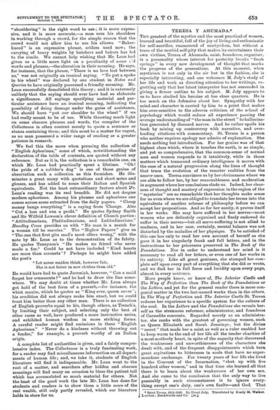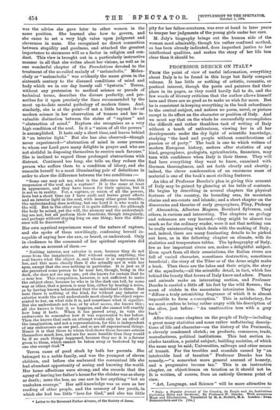TERESA Y AHUMADA.*
TIM greatest of the mystics and the most practical of women, learned and beautiful, full of the joy of living and enthusiastic for self-sacrifice, enamoured of martyrdom, but without a trace of the morbid self-pity that makes its entertainers their own victims, Teresa of Ahumada, saint, foundress, organiser, is a personality whose interest for posterity breaks "fresh springs" in every new development of thought that marks the progress of the generations. At this moment, when mysticism is not only in the air but in the fashion, she is especially interesting, and one welcomes M. Joly's study of her life and work as directing attention to her writings, re- gretting only that her latest interpreter has not succeeded in giving a firmer outline to his subject. M. Joly appears to us to have studied his heroine at too close quarters. He is too much on the defensive about her. Sympathy with her mind and character is carried by him to a point that makes him over-sensitive to the adverse criticism of the school of psychology which would reduce all experience passing the average understanding of "the man in the street" to hallucina- tion generated by diseased nerves. And he rather spoils his book by mixing up controversy with narrative, and over- loading citations with commentary. St. Teresa is a person who neither requires apology nor admits of explanation. She needs nothing but introduction. For her genius was of that highest class which, where it touches the earth, is so simple, and yet so comprehensive, that the common-sense of normal men and women responds to it intuitively, while in those matters which transcend ordinary intelligence it moves with the ease of a natural progression along the lines of thought that trace the evolution of the remoter realities from the nearer ones. Teresa convinces us by her obviousness where we are able to follow her, by her reasonableness and moderation in argument where her conclusions elude us. Indeed, her clear- ness of thought and mastery of expression in the region of the "mysteries" are so remarkable that her thoughts make sense for us even where we are obliged to translate her terms into the equivalents of another scheme of philosophy before we can accept her propositions. And as for her sanity, it proves itself in her works. She may have suffered in her nerves—most women who are delicately organised and finely endowed do suffer in their nerves—but all nerve-suffering is not allied to madness, and in her case, certainly, mental balance was not disturbed by the maladies of her physique. To be satisfied of this one has only to read her own account of herself as she gave it in her singularly frank and full letters, and in the instructions to her prioresses preserved in The Book of the Foundations. Nor in order to understand her mind is it necessary to read all her letters, or even one of her works in its entirety. Like all great geniuses, she stamped her com- plete self upon every part of everything that she did or wrote, and we find her in full force and lucidity upon every page, almost in every sentence.
More people know, or know of, The Interior Castle and The Way of Perfection than The Book of the Foundations or the Letters, and yet for the general reader there is more con- genial matter in the two last-named works than in the others, In The Way of Perfection and The Interior Castle St. Teresa reduces her experience to a specific system for the culture of the soul. In the Letters and the Foundations she reveals her- self as the strenuous reformer, administrator, and foundress of Carmelite convents. Regarded merely as an administra- tor, she ranks with the greatest of governing women, such as Queen Elizabeth and Sarah Jennings ; but the divine " secret " that made her a saint as well as a ruler enabled her to keep warm to the end of her life all the tender charities of a most motherly heart, in spite of the sagacity that discovered the weaknesses and unworthinesses of the characters she dwelt with, and of the frequent disappointments which turn great aspirations to bitterness in souls that have no super- mundane anchorage. For twenty years of her life she lived in the Convent of the Incarnation, "shut up with five hundred other women," and in that time she learned all that there is to learn about the weaknesses of her own sex. And she came to the conclusion that the only way to live peaceably in such circumstances is to ignore every- thing except one's duty, one's own faults—and God. That
• Saint Teresa, 1815-1582. Hy Henri Joly. Translated by Emily K. Walker. London: Duckworth and Co. De,2
Letter to the Reverend Father Alvarez, of the Society of Jesus.
was the advice she gave later to other women in the same position. She learned also how to govern, and she came to set a very high value upon judgment and cleverness in nuns. She recognised no direct connection between stupidity and goodness, and attached the greatest importance to strenuous will as a factor in religion and con- duct. This view is brought out in a particularly instructive
manner in all that she writes about her visions, as well as in one wonderful chapter of the Foundations devoted to the
treatment of the so-called malady of "melancholia." Melan- choly or "melancholia" was evidently the name given in the sixteenth century to the diseased conditions of mind and body which we in our day loosely call "hysteria." Teresa, without any pretension to medical science or parade of technical terms, describes the disease perfectly, and pre- scribes for it upon precisely the lines recommended by the most up-to-date mental pathology of modern times. And, similarly, she is at the point—if not a little beyond it—of modern science in her observation of trances and her in- valuable distinction between the states of " rapture " and "abstraction of mind." Rapture she recognises as a very
high condition of the soul. In it a "union of all the powers" is accomplished. It lasts only a short time, and leaves behind it "an interior light." But she has also observed—though never experienced—" abstraction of mind in some persons to whom our Lord gave many delights in prayer and who are not slothful in disposing themselves to receive such favours." She is inclined to regard these prolonged abstractions with
distrust. Continued too long, she tells us, they reduce the person who suffers them to a condition of idiocy, and she commits herself to a most illuminating pair of definitions in order to show the difference between the two conditions :—
"Some one may ask me, what is the difference between this suspension of the soul and a rapture? It is the same at least in appearance, and they have reason for their opinion, but it is not so in reality. For, a rapture, or union of all the powers, lasts but a short time (as I have said) and leaves great effects and an interior light in the soul, with many other great benefits; the understanding does nothing, but our Lord it is who works in the will. But in the other case it is quite different; for although the body be seized, yet the will, the memory and the understand- ing are not, but all perform their functions, though irregularly, and perhaps without staying long on one thing; here the differ- ence will be discovered."
Her own mystical experiences were of the nature of rapture, and she spoke of them unwillingly, confessing herself in- capable of saying how she saw, or heard, or understood. Only in obedience to the command of her spiritual superiors did she write an account of them :— " Nothing interior, nor exterior is seen, because they do not come from the imagination. But without seeing anything, the soul knows what the object is, and whence it is represented to her, and this more clearly than if she actually saw it with her eyes, except that she sees nothing in particular. It is just as if she perceived some person to be near her, though, being in the dark, she does not see any one; yet she knows for certain that he is near her. This comparison, however, is not sufficient to make the subject clear, because he who is in the dark can tell, by some way or other, that a person is near him, either by hearing a noise, or by having known beforehand that the individual is there. But here there is nothing of the kind, for without any interior or exterior words the soul understands most clearly the object repre- sented to her, on what side it is, and sometimes what it signifies. But she understands not how, or by what means, she knows this; All she knows is that it so happens, and she cannot tell exactly how long it lasts. When it has passed away, in vain she endeavours to remember how it was represented to her before. Then she knows that such an attempt would only be an effect of the imagination, and not a representation, for this is independent of any endeavours on our part, and so are all supernatural things. Hence it is that those to whom God shows these favours esteem themselves much less, and are far more humble than they would be if no such things happened, because they see it is a favour given to them, which cannot be taken away or bestowed by any one else except God."* Teresa came of good stock by both her parents. She belonged to a noble family, and was the youngest of eleven children, and before she embraced the conventual life she had abundant opportunity of seeing and knowing the world. Her home affections were strong, and she records that the agony of leaving her father's house for the cloister was as sharp as death; none the less, no one saw in her anything "but an unshaken courage." Her self-knowledge was as sure as her reading of other people, and the memory of her youth, in which she had too little "love for God," and also too little
pity for her fellow-creatures, was ever at hand in later years to temper her judgments of the young girls under her care.
M. Joly's biography brings out the human side of the woman most admirably, though his rather confused method, as has been already indicated, does imperfect justice to her intellectual qualities, and makes the story of her life less clear than it should be.























































 Previous page
Previous page